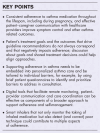Optimizing adherence to medication to improve outcomes in asthma
- PMID: 40105049
- PMCID: PMC11957441
- DOI: 10.1097/MCP.0000000000001166
Optimizing adherence to medication to improve outcomes in asthma
Abstract
Purpose of review: Adherence to medication is essential for asthma control and reducing the risk of exacerbations. Research has accumulated in recent years on causes and consequences of adherence and effective interventions. This review highlights current advances in adherence research and their potential for clinical practice.
Findings: Optimizing adherence to medication can be achieved through interventions that identify individual barriers and train the care team in offering tailored support. Digital technologies that facilitate remote monitoring, patient-provider communication and care coordination are increasingly being integrated into asthma care.
Summary: Adherence determinants reported cover individual, social and health service-related factors. Age and attitudes toward adherence are crucial determinants. Patients' and caregivers' mental health is relevant for adherence and clinical outcomes, highlighting the importance of integrating this aspect into holistic asthma management. Single-site care arrangements are beneficial for adherence. Tailoring adherence interventions to individual needs, using brief questionnaires to assess barriers and recommending evidence-based strategies to address them, have been found useful and feasible across care settings. Digital technologies such as smart inhaler systems and telemedicine-enhanced care have been shown to be effective in randomized controlled trials, yet implementation research highlights challenges to sustaining support on the long-term.
Copyright © 2025 The Author(s). Published by Wolters Kluwer Health, Inc.
Conflict of interest statement
Figures
References
-
- Global Initiative for Asthma. 2024 GINA Main Report. Global strategy for asthma management and prevention. Available from: https://ginasthma.org/reports/. [Accessed 27 November 2024].
-
- Vrijens B, Dima AL, Van Ganse E, et al. . What we mean when we talk about adherence in respiratory medicine. J Allergy Clin Immunol Pract 2016; 4:802–812. - PubMed
Publication types
MeSH terms
Substances
LinkOut - more resources
Full Text Sources
Medical
Research Materials



